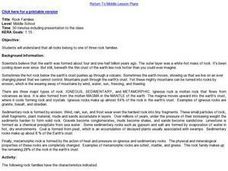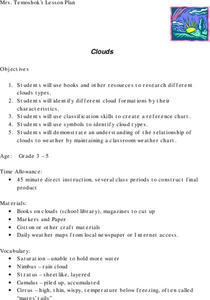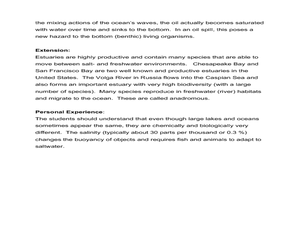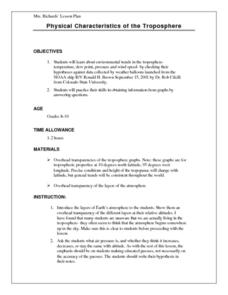Curated OER
Origin of Coal
Students explore how coal is formed. They then discuss the information and answer any questions that they may have on the formation of coal. Students then answer questions in reference to the coal discussion and reading.
Curated OER
Three-dimensional cooperative modeling
Students explore what is present below the surface in order to drill into the ground and record the type of material that the drill brings to the surface. They discuss the benefits and drawbacks of distance communications. Students...
Curated OER
Aerology- The Study of Mars
Students investigate various aspects of the planet Mars. They examine a core sample that is simulated to make observations. Then compare the known sample with one that is unknown and differentiate between the two. Students hypothesize...
Curated OER
Rock Families
Students study the three types of rock characteristics; igneous, sedimentary, and metamorphic. They are divided into three groups and each group takes one of the rock characteristics. They then act out the characteristics of their rock...
Curated OER
Where to Live?
Students examine types of spatial data found in a GIS. In this geography lesson students use a GIS to facilitate analysis and decision making.
Curated OER
Geology of Yosemite
Learners are shown slides of Yosemite and explore how the valley was formed by performing an experiment. Instructions on how to set up the lab are included. They can be assessed orally or by writing a report on the outcome of the lab.
Curated OER
Air Masses
Students examine the physical characteristics of several types of air masses to discover how air masses can be identified and defined by their temperature and moisture content.
Curated OER
Why Do We Need Petroleum?
Students learn the many ways petroleum is used in our industrial society, and the advantages and disadvantages of its use. They explore what it would be like to live in a world without petroleum.
Curated OER
Creating and Analyzing Graphs of Tropospheric Ozone
Students create and analyze graphs using archived atmospheric data to compare the ozone levels of selected regions around the world.
Curated OER
Dig Magazine Archeology Quiz #60
In this Dig Magazine archeology quiz, students answer 4 multiple choice questions covering a variety of topics. Page contains answer and additional resources link.
Curated OER
Effects of Ozone in the Air
Fifth graders learn how ground-level ozone is an air pollution problem. Students measure ozone levels and graph the results.
Curated OER
Changes Inside Planets
Pupils investigate the concept of planetary differentiation. They complete an experiment to simulate it using gelatin and food. The lesson includes vocabulary to increase reading comprehension skills as part of the inquiry. The lesson...
Curated OER
Sea Surface Temperature Trends of the Gulf Stream
Students explore the importance of the Gulf Stream. Using a NASA satellite images, they examine the sea surface temperature. Students collect the temperature at various locations and times. Using spreadsheet technology, they graph the...
Curated OER
Sea Surface Temperature Trends of the Gulf Stream
Students use authentic satellite data to produce plots and graphs of sea surface temperature as they explore the seasonal changes of the Gulf Stream.
Curated OER
CO Buildup City
Students conduct a controlled experiment. They collect data in an organized manner. Students analyze data to reach a conclusion and communicate findings. They explain how city size, temperature, and pollution is related to the air quality.
Curated OER
Clouds
Students explore the characteristics of clouds, their formation, symbols used in their identification, and the relationship of clouds to weather. The lesson plan focuses on how they are formed and their classification.
Curated OER
Natural Gas Lesson-How Natural Gas Forms
Young scholars examine background natural gas and how it is formed and what it is made of. Titles within the series include How Natural Gas Forms, What Happens to Natural Gas when it is burned, and How Natural Gas can be used. Provides...
Curated OER
Teacher's Guide For: Water Temperature and Salinity Experiment
Students experiment with water density, temperature and salinity. For this water lesson, students observe how the coldest water sinks to the bottom of a test tube, and how saltwater sinks in comparison to freshwater.
Curated OER
Let's Get To the Core!
Young scholars practice analyzing ice core samples to discover climate changes. Using the samples, they identify and graph the gas amounts. They use these numbers to determine their effect on global warming. In pairs, they complete a...
Curated OER
What's The Level?
Students examine the movement of the water table and saturation zones. They describe the movements of the water table and locate the saturation zones. Students identify the function of each saturation zone. They develop a model of the...
Curated OER
Rocks Review
In this rocks worksheet, students review the characteristics of igneous, metamorphic, and sedimentary rocks. This worksheet has 4 true or false, 16 fill in the blank, and 5 matching questions.
Curated OER
Physical Characteristics of the Troposphere
Students lexplore environmental trends in the troposphere- temperature, dew point, pressure and wind speed- by checking their hypotheses against data collected by weather balloons.
Curated OER
Physical Characteristics of the Troposphere
Students examine troposphere graphs and mcompare their hypotheses with data collected by weather balloons launched from the NOAA ship, Ronald H. Brown. they write summaries about the physical properties of the troposphere.
Curated OER
Aquifers and Recharge Areas
Students create a model of an aquifer and describe how an aquifer works. They describe how running affects an aquifer and prepare a model presenting to local planners the important aspects of protecting recharge areas.

























